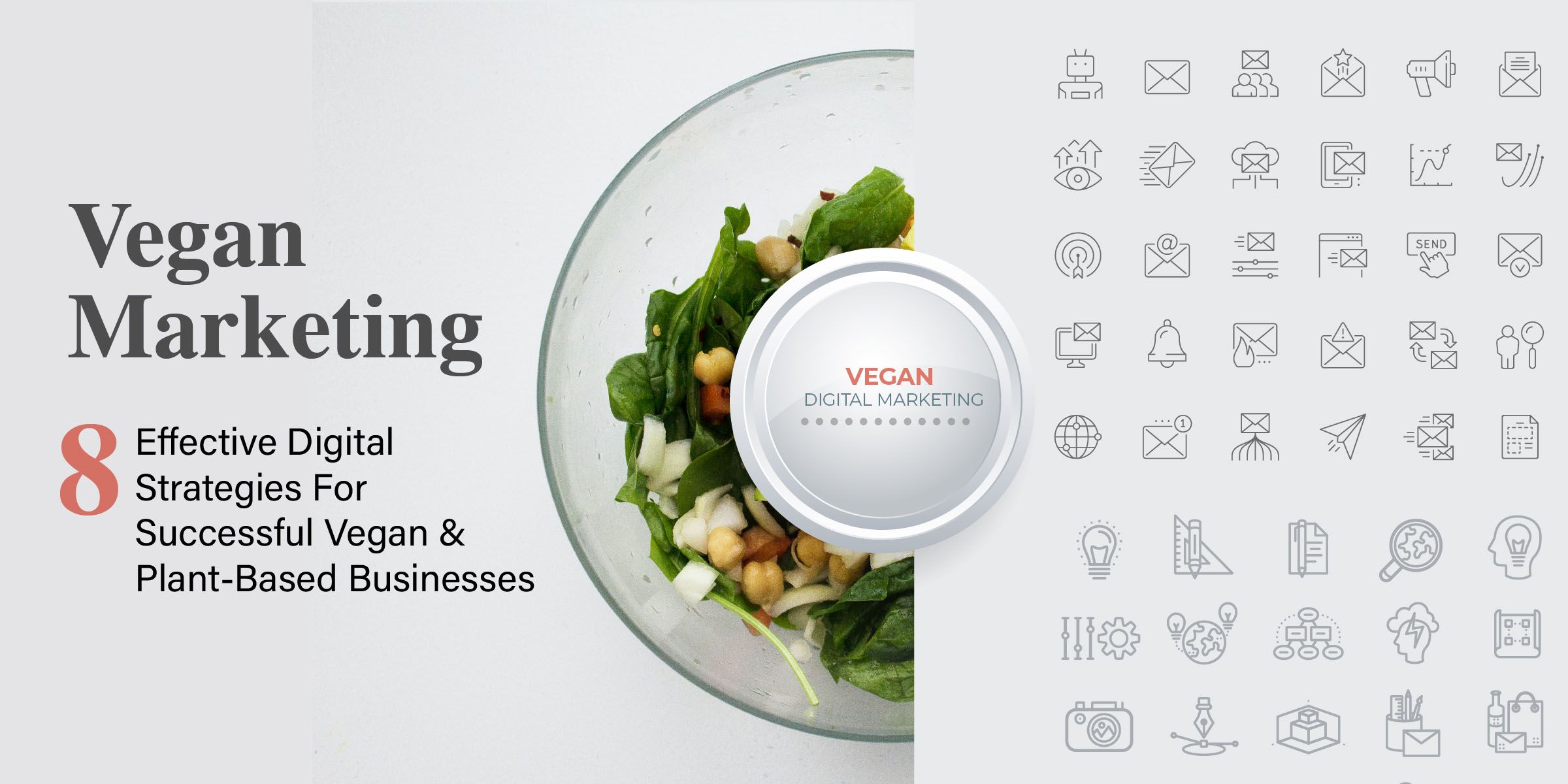
Author
John "Zehn" Baskerville, PMP

Vegan Marketing: 8 Effective Digital Strategies for Successful Vegan & Plant-Based Businesses
Vegan Marketing: 8 Effective Digital Strategies for Successful Vegan & Plant-Based Businesses
Expert tips for capturing the market's heart from a passionate vegan
In today's digital age, leveraging effective vegan marketing strategies is critical to any successful plant-based business. The rise of veganism and the growing demand for cruelty-free products present tremendous opportunities. Yet, with increased demand comes increased competition. Companies must understand and apply the principles of vegan digital marketing to seize emerging opportunities. Let's explore the changing landscape.
First, the global trend towards veganism is dramatically reshaping the food industry, a change reflected by compelling market data.
|
According to a report published by Allied Market Research, the vegan food market, valued at $14.2 billion in 2018, is projected to nearly double, reaching a staggering $31.4 billion by 2026. |
This substantial growth reflects the increasing consumer adoption of vegan diets, driven by health, environmental, animal welfare, and ethical motivations.
Data also reveals...
- The number of vegans in the United States has increased by 600% since 2014.
- The global market for plant-based milk is expected to reach $22.7 billion by 2025.
- The global market for plant-based meat is expected to reach $14.2 billion by 2025.
Beyond food, the demand for plant-based products extends to other sectors, such as fashion, beauty, and wellness, indicating a broad cultural shift towards more sustainable and compassionate consumer choices. The vegan cosmetics market is expected to reach $20.8 billion by 2025, representing a Compound Annual Growth Rate (CAGR) of 6.3%, as reported by Grand View Research2. Meanwhile, the vegan fashion industry, which includes apparel and footwear made without animal-derived materials, is set to hit $109.2 billion by 2027, according to Prophecy Market Insights3. These trends underscore the growing consumer inclination to integrate the vegan ethos into daily life.
Data projections reveal...
- The global market for plant-based personal care products is expected to reach $24.7 billion by 2025.
- The global market for plant-based cosmetics is expected to reach $20.2 billion by 2025.
- The global market for plant-based household cleaners is expected to reach $16.7 billion by 2025.
So, you have a vegan or plant-based business. How do you break through in an increasingly dense market and thrive? These eight tips will guide your success.
1. Build an Impressive Website
Your website is your brand's front door. Given the exponential growth of the vegan and plant-based industry, standing out amidst fierce competition has become more vital than ever. A polished, user-friendly website that mirrors your brand values and effectively communicates your unique selling proposition can steer potential customers away from the many options available. For more tips on building a professional website that stands out, you can read our guide here.
2. Market Position: Vegan and Plant-Based Categories and Channels
The vegan market spans various categories, including food, cosmetics, clothing, and more. Identifying the best marketing channels for each product category is pivotal to your success. The choice of channels hinges on where your target customers spend their time and which channels resonate best with each product type.
3. Know Your Tribe: Understanding Vegan and Plant-Based Customers
Discerning between customers who identify as vegan and those who follow a plant-based diet is vital for effective marketing. Customers adopting a plant-based diet are often primarily concerned with health and environmental benefits. They opt for plant-based options for a healthier lifestyle and a reduced ecological footprint.
On the other hand, Vegans adopt veganism not just for health or environmental reasons but primarily to avoid animal cruelty and exploitation. While health and environmental benefits are also vital, Vegans have a more profound commitment rooted in animal welfare. Recognizing these nuanced differences enables more targeted and effective marketing strategies.
Now that you understand the differences, dive deeper by developing your ideal customer personas. Typical personas include data on age, demographics, location, language, education, employment, and other defining attributes. This knowledge allows you to tailor your marketing strategy to their needs and preferences.
4. Speak Their Language: Effective Messaging
Once you've identified your ideal customer personas, it's time to hone your messaging. Craft persuasive communication tailored to each customer segment that underscores the value proposition of your products. Additionally, it is crucial to establish an emotional connection with your audience, drawing on the values that drive their vegan or plant-based choices.
5. Foster Relationships: Post-Sale Marketing
Marketing should continue after the sale. To retain customers, engage with them continuously. Value-nurturing emails are valuable for maintaining a solid connection with your customers. Offering loyalty discounts, extending trials, or incentivizing referrals are a few tactics that can foster stronger customer loyalty.
Additionally, decenter your product. It may sound counterintuitive, but making your brand about the product and the customer can go a long way. Pinky Cole of Slutty Vegan gets this. Likely the greatest Vegan entrepreneur of the 21st century, Pinky understands that when customers come to her locations, they are not just getting great food but also a unique customer and community experience in coming together around Vegan food. It's about her customers; they leave her locations feeling satisfied, uplifted, and joyful. There is no better way to win customer loyalty than that. Moreover, Pinky gives back to uplift the communities she cares deeply about. Moving beyond sustainability, a focus of many plant-based movements, to regenerative impact, Pinky's philanthropy is a blueprint for empowering black communities and a role model for other vegan businesses that want to uplift the ecosystems they benefit from.
6. Getting systems in order: Implementing and Executing Strategies
Efficient marketing strategy implementation necessitates harnessing robust systems such as Customer Relationship Management (CRM) and Business Intelligence (BI) tools. These systems must seamlessly integrate with your website and marketing channels to enable data-driven decision-making.
7. Continuous Improvement: Testing, Measuring, Optimizing
One of the tenets of successful digital marketing is continuous optimization. Rigorous testing and measurement of your marketing initiatives will reveal what's working and not and where to make adjustments. This data-driven approach ensures that your strategies are always at peak performance, driving the best results for your business.
8. Stand Up and Stand Out: Championing Your Cause
Don't be shy about your mission. Your products stand for something greater than commerce; they stand for a sustainable, ethical, and healthier world. Here are two ways to stand up to harmful industries and improve your rightful position within the market.
A.) Strike a Blow:
Boldly confronting non-vegan industries, like Oatly's impactful campaign against the dairy industry, can resonate deeply with your audience. In the image below, Oatly has boldly purchased a large banner space on the side of a building that directly challenges the dairy industry to showcase its carbon footprint data. We're still waiting for a response from Big Dairy. Indeed, big Dairy will attempt to respond in other ways, but they won't be offering up that data, as any objective reading of that data would be unforgiving for them. It's a checkmate move by Oatly.
B.) Educate Your Audience:
As a vegan or plant-based business, educating your audience is a core mission. Consider the following alarming statistics:
|
Each year, approximately 70 billion farmed animals are slaughtered for human consumption. To contextualize this, it's more than ten times the human population. Every year, the year after, and the year after again... |
- Animal agriculture is responsible for more greenhouse gas emissions than all transportation emissions combined; planes, trains, and automobiles.
- Lastly, unhealthy diets, including high meat consumption, contribute to numerous health problems such as heart disease, diabetes, and other terminal health conditions. These issues often disproportionately affect low-income individuals, black communities, and other people of color or marginalized groups.
By sharing these facts with your audience, you can enlighten them about the real-world impacts of their dietary choices and encourage a transition towards more sustainable and compassionate alternatives.
Conclusion
To summarize, here are the action items from each of the eight strategies:
- Create a professional and engaging website to stand out in the growing vegan market.
- Understand the different vegan product categories and identify the most effective marketing channels.
- Identify the differences between vegan and plant-based customers, and create personas to target your marketing efforts better.
- Craft tailored messages for each customer segment that highlights your product's value and resonate emotionally.
- Engage with customers post-sale to foster stronger relationships and encourage repeat business.
- Use advanced CRM and BI tools to implement and execute your strategies seamlessly.
- Test and optimize your marketing strategies based on data and analytics.
- Boldly promote your mission and educate your audience about the impacts of animal farming.
Remember that your journey in the vegan business space is about more than just commercial success; it's about making a real, positive impact on the world. Keep sight of your mission; always keep your customers at the heart of everything you do. Your commitment to a healthier, more sustainable, and compassionate world sets you apart, and this emotional connection forms the core of your relationship with your customers. Harness these eight strategies to grow your business while staying true to your mission; your vegan business will thrive.
We invite you to Contact Us for more guidance or assistance with vegan digital marketing. We're passionate about helping plant-based businesses succeed and would love to be part of your journey.

Identifying a Committed Vegan Marketing Agency vs Greenwashing Pretenders
Article Tags
Author
John "Zehn" Baskerville, PMP

